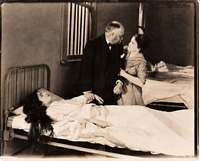

The Triumph of the Weak (1918) Vitagraph Co. of America. A Blue Ribbon Feature. Distributor: Greater Vitagraph. Presenter: Albert E. Smith. Director: Tom Terriss. Scenario: Garfield Thompson. Camera: Joe Shelderfer. Cast: Alice Joyce, Walter McGrail, Templer Saxe, Eulalie Jensen, Adele De Garde, Billy Carr, Bernard Siegel. 5 reels This film appears to be LOST
| A still from the film (Thanks to Derek Boothroyd for this scan) |  |
| Edith | Alice Joyce |
| Jim Roberts | Walter McGrail |
| Robert Jordan | Templer Saxe |
| Brown | Bernard Siegel |
| Teddy | Billy Carr |
Reading the title of the above one is not disappointed in this Vitagraph Blue Ribbon feature, it is an old-fashioned melodrama, of the 10, 20 and 80-cent variety. It is a picturization of the ancient theme of the woman who steals to provide food for her child and the consequence which follow her act, the narrow escapes she has of the many pitfalls, in her efforts to live in the straight and narrow path.
It is not a particularly pleasant story, although it, no doubt, will appeal to the highly emotional, as it is full of sob stuff. The opening picture finds Edith (Alice Joyce) in prison where she has been for the last three years. She is a widow and her baby has been placed in an institution. She is paroled, finds her child and steals him from the asylum. After wandering around she finally obtains a position in a department store, where Jim Roberts, superintendent, falls in love with her. They are married, but she fails to tell him of her past.
Mabel, also freed from prison, demands that Edith join with her and her side partner in a crime, under threat of exposing her past to Jim. Jordan, a friend of Jim's visits them. He is a detective, and recognizes Edith as a former thief. Further to involve her, Mable, hiding from the police, forces Edith to give her refuge in her home, where she immediately proceeds to steal everything in sight, money being her particular passion. Jordan tells Jim he is harboring a thief and he tells Edith she must leave, but Edith, still fearing Mabel, confesses to the theft of money and Mable is allowed to stay. The two men then plan to trap Mable by placing $400 in a desk.
As Edith takes the money from the desk, lights are flashed on and she stands before the two men as the thief. The distracted girl now tells her husband of her first theft to save her baby and of her present attempt to keep her past from him. The men have a battle, the detective gets badly beaten up, but is moved by her great courage, gives her back to Jim and the child and through his efforts she obtains a free pardon.
Alice Joyce takes the part of the much-abused wife efficiently. Walter McGrail, the husband, plays a manly role and is a likeable character. Other members of the cast do all that is required of them.
THE PICTURE
Five-Part Drama by Edith Ellis, adapted from the play "My Man," by Miss Ellis. Released by Vitagraph. Starring Alice Joyce. Supported by Walter McGrail, Eulalie Jenson, Adele de Garde, Templar Saxe, Bernard Siegel and Billy Carr.
Values
| Entertainment | Good |
| Story | Good |
| Acting | Good |
| Photography | Very Good |
| Technical Handling | Good |
| Settings | Very Good |
| Moral Effect | Wholesome |
Points of Interest
The appearance of Alice Joyce in a sympathetic role, slightly suggestive of her characterization in "Within the Law." The presentation of the problem of the released woman convict. The playing of an able child actor, Billy Carr.
Story and Production
Miss Joyce has again been given the role of a jail inmate and she vivifies it with her direct and sincere playing. Her work overshadows certain improbabilities of plot and holds the interest.
Edith Merrill, a young widow, is sent to prison for a theft of food for her starving boy. The child is placed in an orphanage. Released later on parole, Edith steals her boy and disappears. She meets a young department store manager and marries him, not telling him of the prison past.
She lives happily until "Diamond Mabel," another inmate, discovers her. Just at this time the woman's pal, Micky Bill, is nabbed by the police and Mabel desperately tries to get money together to hire a lawyer. Finally she forces Edith to steal a sum of money entrusted to her husband's care.
Edith is discovered n the act of taking the money. She confesses everything and her husband's heart softens. But a detective arrests her for breaking her parole, and she goes back to prison. The story concludes with a pardon and the happy renewal of married life.
ADVERTISING IDEAS
Liberal use of new Alice Joyce portraits should be made. This beautiful star has been a favorite since the first days of the photoplay and was never more popular than at the present time. Pictures from the photoplay, showing Miss Joyce as a convict, may be played up. Suggest that the role is similar to her famous one in "Within the Law." You may be able to interest local civic organizations, since "The Strength of the Weak" deals with the problem of the released woman convict. Direct interest can be aroused in this way. "The Strength of the Weak" is the sort of picture to appeal to your feminine patrons. Personal letters should be sent to them, making clear the problem presented by "The Strength of the Weak." Bring out the fact that the photoplay is adapted from the stage play, "My Man." Call attention to Walter McGrail's appearance in the cast. He is growing in popular favor.
Catch Phrases
"What becomes of the girl who is sent to prison?" "Can a woman live down a prison sentence?" "Should she tell of her prison past and risk her happiness?" "What woud [sic] you do if you discovered that your wife had a prison record?" "How a young mother fights against tremendous odds." "Just how much would you forgive your wife?"
"THE STRENGTH OF THE WEAK [sic]."
Vitagraph Blue Ribbon Feature Presents Alice Joyce in a Screen Version of "My Man," a Stage Success Written by Edith Ellis. Directed by Tom Terriss. Released May 13.
| Edith | Alice Joyce |
| Jim Roberts | Walter McGrail |
| Robert Jordan | Templer Saxe |
| Mabel | Eulalie Jensen |
| Lizee | Adele De Garde |
| Teddy | Billy Carr |
| Brown | Bernard Siegel |
The Story: Frank Merrill, a Great Lakes pilot, loses his life in a storm and his wife, Edith, to support her child leaves for the city where she steals and is imprisoned. Three years later, upon her release, she takes her child from the state orphanage and goes to another city where she secures employment in a department store. She marries the superintendent, Jim Roberts. Mabel, who served time with Edith, is freed and arranges with Mickey Bill to enlist the aid of Edith in a robbery under threat of exposure. The burglary is committed, and when Mabel is trapped Edith, rearing a revelation of her past, says that she is responsible. In a trap laid by Detective Jordan to get Mabel the truth comes out and Edith's past is laid bare to her husband. He forgives her and the thieves are rounded up.
"THE TRIUMPH OF THE WEAK"
Alice Joyce in Vitagraph Plays a Weak-Willed Woman.
Reviewed by Hanford C. Judson.
In these days of stress the coward heroine, "made just for loving," who is subnormal in that she lacks the mind to use common sense and therefore with no taint of viciousness gets into trouble is not, I feel safe in saying, the best type to set before red-blooded spectators getting less and less sentimental all the time. I do not say that this picture, "The Triumph of the Weak," a Vitagraph Blue Ribbon feature in five reels, will not be popular. It is very sure to be in many places, but the time is passing when such will be widely liked.
The strength that the weak have, as shown here, is the knowledge of love in a stronger nature on which it can lean. Now most of us are weak, and to get strength for the stronger is perfectly wholesome and normal. But in this picture the dramatist makes his heroine in her beautiful and happy home willing to steal $500 intrusted [sic] to her husband, destroy the home, and bring ruin and dishonor on him and herself just to keep him from finding out that she had once before, when starving as a widow with a baby to care for, stolen to get bread and been sent to prison for it, The picture had been dramatic up to that point, it had been holding well. Then it upsets and all the interest is spilled.
The story was written by Edith Ellis. It has much that is fresh and interesting, is well constructed up to the point of the second break, and is certainly well screened and acted. Alice Joyce has the leading role, with Walter McGill [sic] as her second husband. Eulalie Jensen plays the Broadway woman who had known her in prison and appears when she is beginning to be happy. The less important characters are full of local color, and help the story greatly--among them are Adele De Garde as a tenement girl of gentle nature and Templer Saxe as a plainclothes man. The director is Tom Ferris.
Last revised December 23, 2008